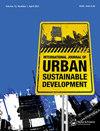领土和平:土地治理和可持续建设和平
IF 2.4
Q3 ENVIRONMENTAL STUDIES
International Journal of Urban Sustainable Development
Pub Date : 2022-04-12
DOI:10.1080/19463138.2022.2054814
引用次数: 1
摘要
冲突对土地权属、使用、分配、可及性和治理产生强烈影响;因此,可持续的建设和平战略要求从和平谈判阶段开始就建立以陆地为基础的体制安排。基于领土和平的概念,这些安排在冲突后重建领土的集体、生产和象征功能,以及解决与土地不平等有关的冲突根源方面发挥了关键作用。本文为领土和平概念的发展做出了贡献,提供了一个基于三类安排的实施框架,并对其进行了测试,以定性地探索和比较两项全面和平协定:哥伦比亚和菲律宾。土地可以在处理领土和平的集体层面方面发挥和平缔造者的作用,特别是当它是和平协定的核心时;然而,如果缺乏信任、安全性和技术能力,它的实现仍然不稳定。本文章由计算机程序翻译,如有差异,请以英文原文为准。
Territorial peace: land governance and sustainable peacebuilding
ABSTRACT Conflicts have a strong impact on land tenure, use, distribution, accessibility, and governance; consequently, a sustainable strategy for peacebuilding requires the set-up of land-based institutional arrangements from the peace negotiation phase onwards. Based on the concept of territorial peace, these arrangements have a key role in the reconstruction of the collective, productive, and symbolic functions of the territory after conflicts, and in addressing conflict root causes related to land inequality. This paper contributes to the development of the concept of territorial peace by providing a framework for its operationalisation, based on three categories of arrangements, and testing it, to qualitatively explore and compare two comprehensive peace agreements: Colombia and the Philippines. Land may take the role of peacemaker in addressing territorial peace’s collective dimensions, especially when it is at the core of a peace agreement; however, its implementation remains volatile if it lacks trust, security, and technical capacity.
求助全文
通过发布文献求助,成功后即可免费获取论文全文。
去求助
来源期刊

International Journal of Urban Sustainable Development
ENVIRONMENTAL STUDIES-
CiteScore
4.00
自引率
4.00%
发文量
24
期刊介绍:
International Journal of Urban Sustainable Development aims to provide a forum for cutting-edge research and rigorous debate for an in-depth and holistic understanding of the complex inter-related environmental, social, economic, political, spatial, institutional and physical challenges facing urban areas. Its premise is that multi-disciplinary approaches provide the space for the range of disciplines and perspectives related to the full breadth of issues that affect urban sustainable development.
 求助内容:
求助内容: 应助结果提醒方式:
应助结果提醒方式:


